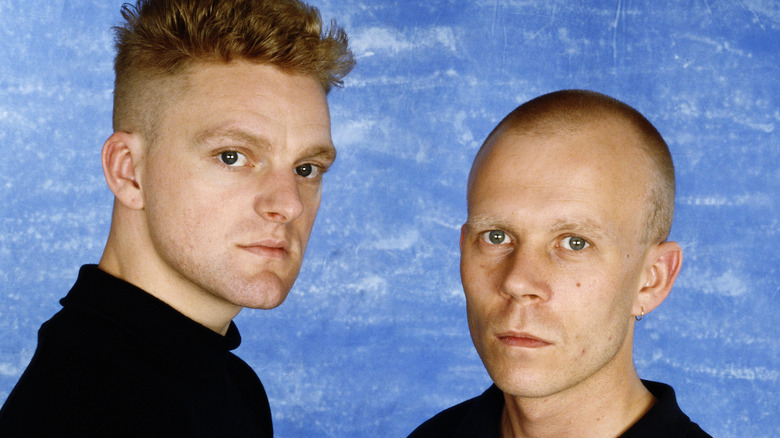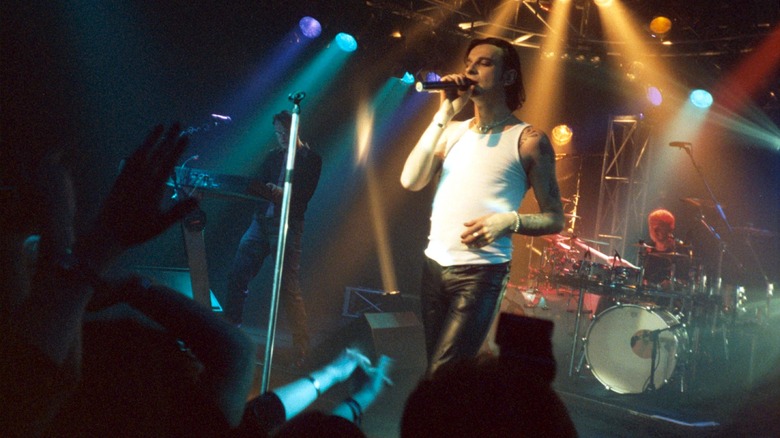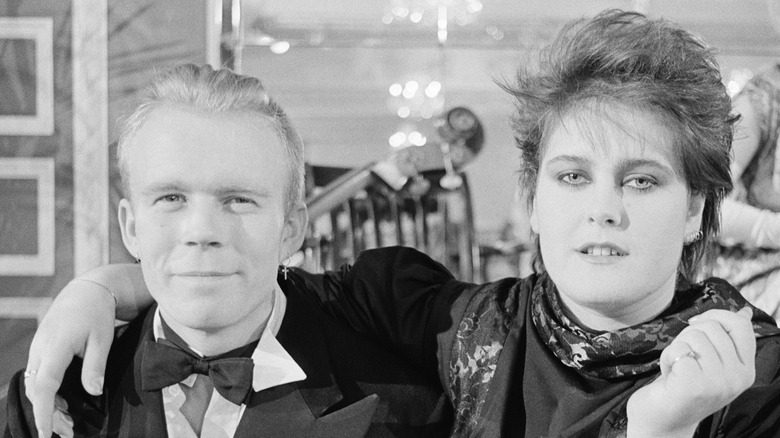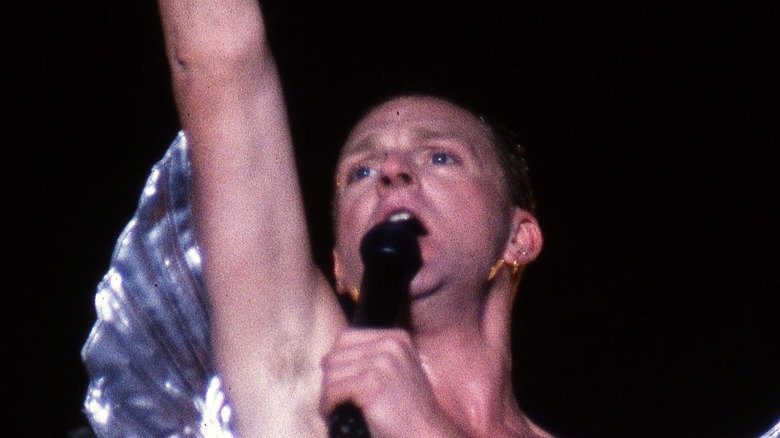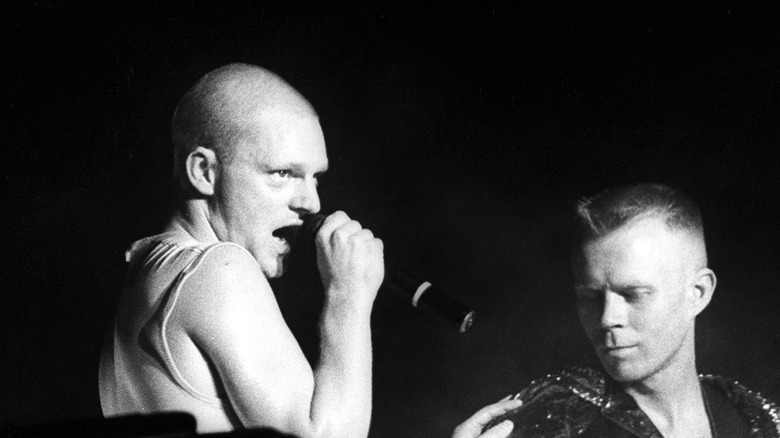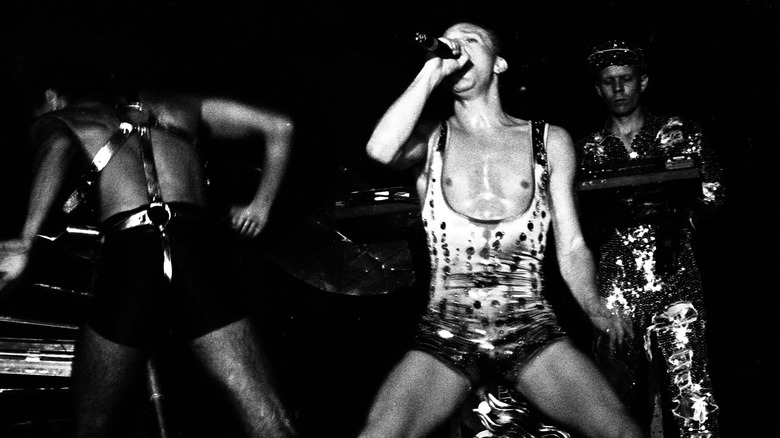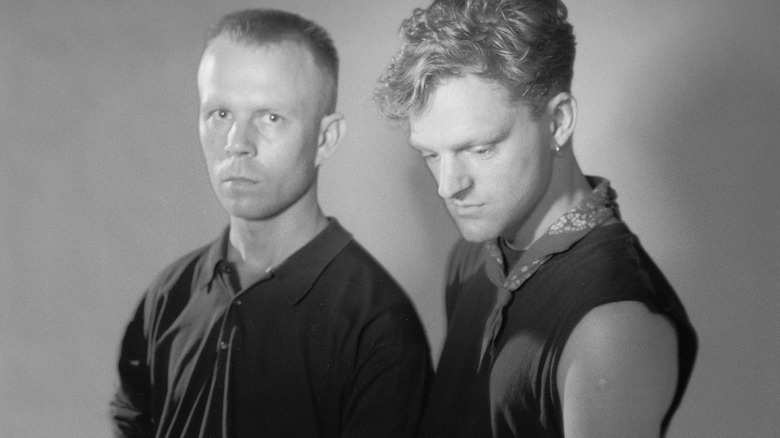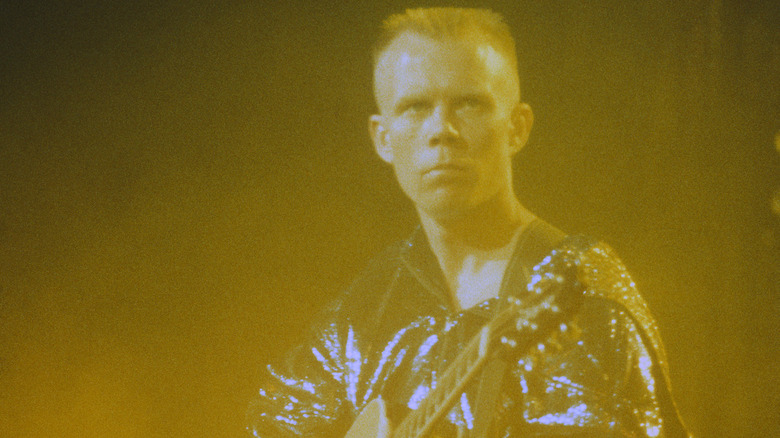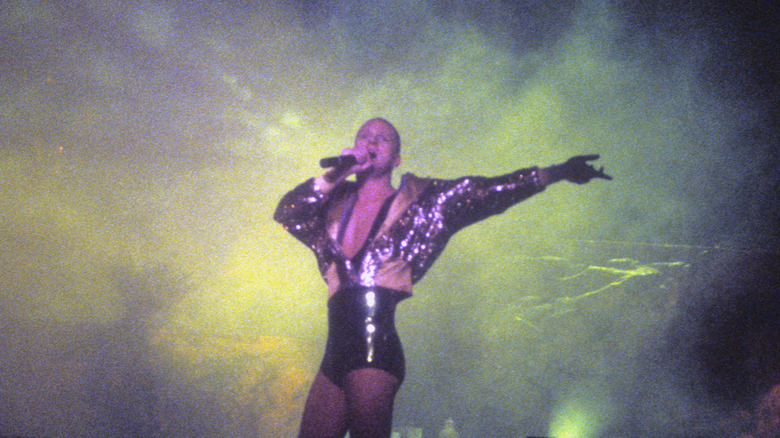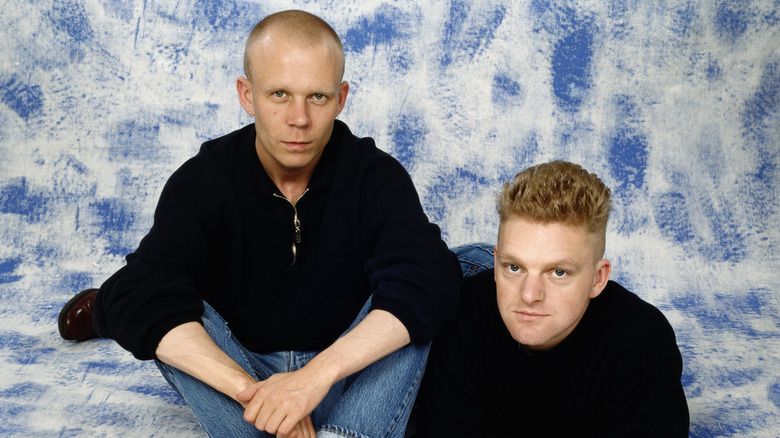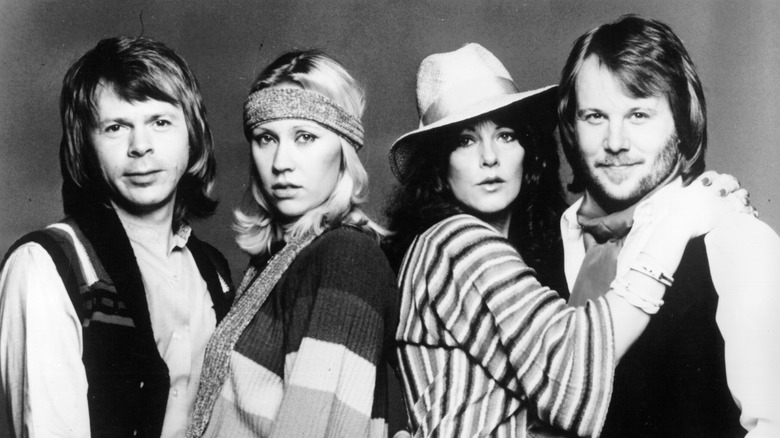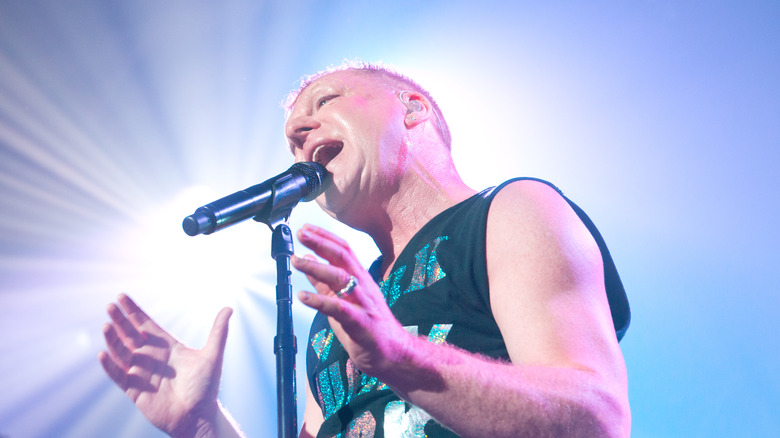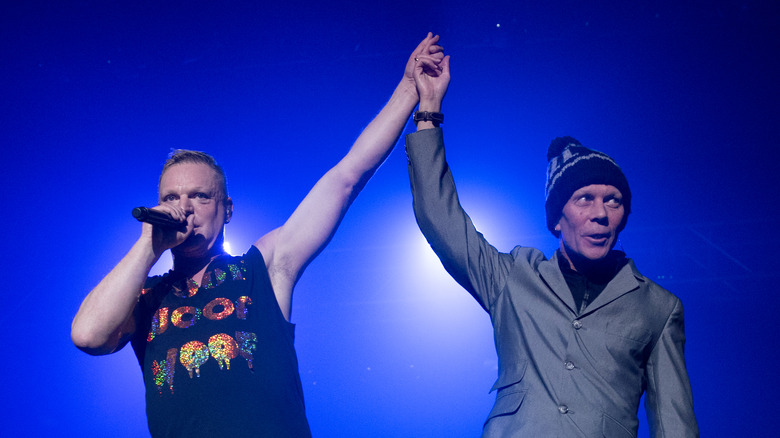The Untold Truth Of Erasure
The synth pop band Erasure was at the forefront of the synthpop movement. The duo has had a tremendous impact on pop music and pop culture. They were a powerful force in music, having chart-topping album after chart-topping album for years. Their name is deeply associated with the '80s, when they first started making hits, but some of their most beloved songs (like 1994's "Always") came later. The band has lasted for almost 40 years, continuing to release new music.
Erasure is an incredibly influential electronic duo, famous for their catchy hits and romantic singles. Their synthy sound, packed with memorable chords, is mostly the work of keyboardist and songwriter Vince Clarke, who, as noted by Gigwise, was already an important figure in pop before Erasure. Clarke had been a key member of several other bands, and he wrote some of the most successful synth-pop hits of the 80s. The lyrics were primarily the work of the vocalist Andy Bell.
Their now iconic, lavish style was largely Bell's influence. Bell was one of the first openly gay pop stars, in an era which was generally considered extremely conservative. As stated in an interview with The Guardian, his experiences pushed him to be as outrageous onstage as he wanted. As discussed in the Orlando Sentinel, the band's image is also tied to their elaborate live shows and videos. Without a full band, the two experimented with extravagant looks and stage personas to keep their audience engaged.
Vincent Clarke founded Depeche Mode
Vincent Clarke has described his younger self as "restless" and "indecisive," which might explain his history of starting bands and then moving on quickly. Probably the most famous of these bands is Depeche Mode.
The influential electronic-pop band Depeche Mode was formed in 1980 by Vince Clarke, Martin Gore, Andy Fletcher, and Dave Gahan. Clarke was the band's keyboardist, as well as one of the main songwriters. As described by Vice, he was responsible for the majority of the band's first album, "Speak & Spell." He wrote several of the band's first big hits, including "Dreaming of Me," "New Life," and "Just Can't Get Enough."
The album was a massive success, and Depeche Mode was a part of the synth pop movement that would go on to sweep the United Kingdom. In a BBC interview, Clarke described the rise of synth pop as something no one had ever heard before, stating, "It wasn't people rehashing old ideas with new technology. It was a completely new type of music ... it was a revolutionary time." Almost immediately after the band hit the top 10, however, Clarke quit. In an interview on Night Network, Clarke explained that he felt the band was going in a direction he wasn't interested in. "We had our arguments and our problems ... it was really new to us, so I think the pressure was much greater."
Vincent Clarke was behind Yazoo
After Clarke left Depeche Mode, he had to prove that he could write hits without them. He turned to someone he'd briefly met in childhood: Alison Moyet.
Clarke and Moyet had gone to Saturday music school together, but never had anything to do with each other. As described by the Independent, Moyet put an ad in the Melody Maker, stating that she was looking for a band to sing for. Clarke spotted it, and asked her if she would be willing to sing a demo that he had just recorded for the label. She agreed, and shortly after, the label wanted it as a single. It was called, "Only You," and it would become a major hit. They formed the band Yazoo (or Yaz in the United States.)
According to Moyet, she and Clarke worked well together, but they were never friends. In an interview she explained, "We never spoke about anything other than recording — nothing. Suddenly we were in a really successful band but we hadn't even ever gone for a pint together. It was really weird — almost like an arranged marriage." Their dynamic was frustrating for Moyet, who believed that Clarke was still upset about what had happened with Depeche Mode. Ultimately, after two successful albums, Clarke left Yazoo, too.
Andy Bell had to audition
Another band started with an ad in Melody Maker. When Vince Clarke was ready to start another band, he advertised that he was looking for a singer. One of the applicants was Andy Bell.
Bell was a complete unknown. He was also a massive fan of Clarke's and wanted to work with him. In a 2019 BBC radio broadcast, Bell stated that after he saw that Yaz had broken up, he even considered trying to write to Clarke to ask if he was looking for a new singer. When he went to the audition, he was determined just to enjoy meeting Clarke and singing for him. During the audition, Bell had only a couple of minutes to learn the songs and decide how he was going to perform them. According to Clarke, he was able to come up with an interpretation immediately and deliver on the first attempt.
"I'm a very ... cold writer," Vince explained in an interview with Yahoo Entertainment, "We were looking for someone who could bring some soul to the songs. Andy brought that instantly." Clarke auditioned more than 40 singers, but Bell's voice was distinctive and, most importantly, he could sing with emotion. Bell got the gig and became the second half of the duo.
Childhood bullying pushed Bell to be out and proud
Andy Bell might not have had much experience in the music world, but his life experiences encouraged him to become an unapologetic performer. He would become one of the very first out gay pop stars.
In an interview with The Guardian, Bell explained that he went to a "posh school," but came from a large family that lived in public housing. It was difficult to find a place he fit in. He stated that there was "nothing for young people to do except get drunk and fight." There was no openly gay scene in Peterborough, the area where he grew up, just the beginning of a punk scene. Bell enjoyed the music, but found the atmosphere at the shows too violent. He tried to pierce his lip with a safety pin, but couldn't push it all the way through on his own. He tried dyeing his hair, but was sent home from school.
When he was older, he moved to London with a punk friend named Jill. By the time he auditioned for Vince Clarke, he was singing in a band called the Void and working as a shoe salesman. His entire life changed once he was in Erasure, but his early experiences pushed him to always be himself onstage. "I'd had enough of being bullied," Bell said, "I thought I'd put myself out there, as outrageous as I could be, so there was nothing more that people could say."
Their first album was a flop
The first Erasure album, "Wonderland," was released in 1986. The songs on their debut album, particularly, "Oh l'amour" and "Who Needs Love Like That" are now beloved, but when the album was first released, it was considered a failure.
"Oh l'amour" was popular around Europe and Australia, but on the whole, "Wonderland" did not take off right away. As described by Andy Bell in a BBC radio interview, the album cost more to make than it made back. Their songs did not make it on the radio very often.
According to Vince Clarke, the two started touring and playing live at venues that were "pretty much like toilets" in order to get more publicity for their songs and build a following for the band. Despite the disappointing response to the first album, Clarke has stated that it was this tour that made him and Bell become real friends.
Andy Bell thought he was going to be fired
Depeche Mode had fallen apart due to arguments over the direction of the band, and Yaz had split because of the dynamic (or lack thereof) between Vince Clarke and Alison Moyet. After the first album failed, Andy Bell worried that his partnership with Clarke would end the same way.
During the recording of the first album, Bell found working with his hero Vince Clarke intimidating. In an interview (quoted via Classic Pop) he described how he had lost his confidence and struggled to sing in front of Clarke at all: "I had really lost my confidence in the studio and reverted back to being a choirboy in school, I was running out of breath at the end of lines, and he had me lying on the floor, all kinds of things, trying to get me comfortable." And when the album did poorly, he worried Clarke might fire him. He had only been employed as a singer, so he could have been replaced. "I thought I'd get sacked after the first album," Bell said in an interview, "but he stuck by me."
Even though "Wonderland" hadn't performed as well as they had hoped, the duo forged a true friendship on the tour. "I think it made our relationship strong," Clarke said of the tour in a BBC interview, "It was us against the world ... I think it really brought us together."
They wrote the chords first
Their new, closer partnership led them to work on the second album in a new way. According to Vince Clarke (via Classic Pop) he had already written the majority of the first album when he hired Andy Bell. Other than "Oh l'amour," which Bell wrote the lyrics to, most of "Wonderland" was Clarke's work. For their next album, the two worked together on the music from the beginning.
"It was a fantastic relief for me," Clarke explained, " it's quite tough writing songs on your own — you start repeating yourself. When we started writing together, Andy was pushing the boundaries more."
In an interview from the BBC, Bell described their writing process. The two would meet, either at Bell's or Clarke's house, and Clarke would start playing the guitar or piano. Clarke would start by playing different chord structures and Bell would sing melodies over them until they felt they had "enough to ... make a song." Occasionally they would come up with lyrics in these sessions, but often Bell would take the tapes home and come up with the lyrics later.
The No. 2 hit that made them stars
The duo wrote a single for their second album: "Sometimes." Even while they were writing it, Clarke and Bell were confident that the song was going to be a hit. "We left the studio and went to the pub, we were so pleased with ourselves," Clarke said in an interview on Greatest Hits Superstars. Daniel Miller, the producer behind Erasure's label Mute, agreed. When he first listened to a tape of "Sometimes" in the recording studio, he recalled thinking, "Yeah, this is the one. This is the one that's gonna break through."
He was right. Soon, the band was frequently being interviewed on TV, performing massive gigs, and had so many fans that they would get "hassled" when they went out in public. The song put them on the charts and made them stars, but surprisingly, it was never a No. 1 hit. "Sometimes" was kept out of the top spot by Europe's "The Final Countdown."
"We felt quite frustrated because it was kept off the number one ... for ages and ages," Bell stated, "I mean, it was amazing to have a number two, but it would've been just that bit more having a number one."
Their first fight was over their hit's name
Erasure's third album, full of synth-pop hits infused with R&B, made the band an international hit, especially in America. "It was a total surprise," Vince Clarke said in an interview with Billboard, "We had played America on a couple of short tours and played these small venues ... tiny little clubs. When 'Chains of Love' had charted, we were pretty blown away."
The band had a "heated debate" over the title of what might be their biggest hit: "A Little Respect." According to an interview on the BBC, Clarke feared giving the song that title would make people think of the Aretha Franklin song, "Respect." Ultimately, however, the song was a hit, regardless of the title.
Some theorize that the album's success in the United States was because of its R&B influence. Andy Bell had been a fan of Motown records since he was young, and according to Classic Pop, was listening to classic disco while they were working on their third album, "The Innocents." According to Bell, Clarke wasn't a fan of Motown and preferred to avoid listening to other bands while they were working, but the influence on the album is still palpable. "A lot of the soul influence on The Innocents came from Andy," Clarke stated, "he's a real soulful singer." Bell also credited Clarke with the sound, saying, "I don't think Vince realizes how soulful he is, because he's kind of a contrarian."
They may have started an ABBA revival
Erasure had already had five No. 1 albums in a row, but they didn't have a single top the U.K. charts until they tried a cover. Having written numerous catchy hits of their own, they decided to try recording something by the Swedish pop band ABBA.
As told by Vince Clarke, the duo were in a pub when Andy Bell brought up the idea of a potential album that was entirely covers of ABBA songs. Bell had always been a "huge fan" of ABBA, and Clarke appreciated their songwriting, so they decided to try. Clarke explained in a BBC interview that the band arrangements on the original songs were traditional, so the songs were very open to different interpretations. Originally, they had planned to do a full length album, but they ended up only recording four. This became an EP titled "Abba-esque," which would become a No. 1.
"We were as shocked as everybody else ... when it started actually being successful and selling ... We were amazed," Clarke said of the EP's unexpected success. "After that it seemed that Abba had a ... bit of a revival." While Clarke has been quick to avoid giving Erasure the credit for ABBA's renewed success, others have attributed the revival to the success of "Abba-esque."
Andy Bell is a gay icon
The band was a prominent part of the synthpop movement that swept the '80s, but its impact extends beyond music. As described by Advocate, Andy Bell was one of the first openly gay frontmen (along with Jimmy Somerville of Bronski Beat.)
While reviewers like Hayden Manders of Nylon, have described the incredible impact of hearing an openly gay artist sing about queer romance, Vince Clarke told Equality 365 that he doesn't think of Erasure as specifically a gay band (though he was very happy to be considered an ally to the LGBTQ community). "The fact is that Andy has just always been very honest about his sexuality," Clarke explained. "It has never been an issue with us."
The band has always been popular in the gay community. Their first album, which initially got very little traction, played in gay clubs. During a BBC interview, Bell described the first time he heard his own music played in public, saying, "I used to go to a few gay clubs and bars in London, and I remember walking into the bar and the DJ said, 'Here's Erasure!' and then it came on: 'Who Needs Love Like That?'"
They're still releasing music
Unlike Vince Clarke's previous bands, which he remained with for no more than two albums, Erasure has never broken up. For nearly 40 years the electropop duo has been releasing new music together. According to Clarke, the band's longevity has come from the friendship between himself and Andy Bell. "There are no egos in the band," Clarke said in an interview with Gigwise, "If either of us presents an idea that the other doesn't like then we just bin it; no one fights for their corner."
The band's most recent album, "The Neon," was released in 2020. The title refers to, "a place, but not a specific place. It's a place that lives in the imagination, that we put in the real world" (via Advocate).
As described on the label's website, both Clarke and Bell have both taken time to work on personal projects, but they came back together for the 18th Erasure album. And it doesn't seem like the duo will stop working together any time soon. According to Clarke, they're still trying to write the perfect pop song. " A good pop song, for me, is something that has an emotional twist in it," Clarke explained, " And that could be in the lyrics or the chord change but it's something that will take you somewhere completely different. Getting that exactly right is an art."
